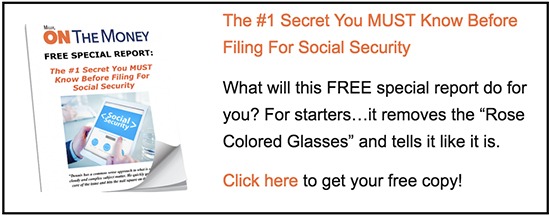Bob and Ray were close friends; both retired and lived across the street from one another. One fateful morning, each took their coffee into the den, flipped on the computer and checked their brokerage account.
As the data popped up, they both did a double take…. “What the heck is going on?” Overnight their lives changed dramatically!
Like TV mysteries, this week’s episode is based on real-life events, although names are changed, and math is simplified.
Bob & Ray both worked hard, raised wonderful families, lived within their means, saved their money, and retired 3 years earlier. Each had a retirement portfolio of $1.2 million.
They self-managed their money conservatively using an online brokerage firm. No more chasing rainbows, preservation of capital and safe, secure income was their mantra. Each had enough guaranteed income to supplement their social security and pay their bills with money left over.
No money worries – their finances were under control. As long as they kept following their plan, they were financially set for life.
So what happened?
Each invested $1 million in safe, top quality bonds. They laddered them over ten years and averaged 6% return. The remainder was split between stocks and a money market account paying 4%.
Bob’s brokerage account showed that there was no change in his investments; however, the market value of his bond holdings skyrocketed. He could sell his bonds for more than twice what he paid for them. His portfolio jumped from $1.2 million to well over $2 million – overnight.
Ray’s brokerage account did not change in value. However, he discovered he had over a $1 million in cash. His bonds had been redeemed. Much like paying off a mortgage early, the borrowers paid off their bonds.
Ray quickly went to the bond screen and was shocked to find the best yield he could find for quality bonds was around 2%. His “guaranteed interest income” from his bond holdings of $60,000 annually could not be replaced. If he wanted to invest in quality bonds, he could earn around $20,000, not enough to pay his bills.
The yield on his $100,000 cash account dropped from 4% to 1/100th of 1%. Instead of $4,000 interest, it now paid a measly $10! Overnight – his safe, guaranteed income dropped by almost 2/3.
How did this happen?
Both used the tools provided by their online brokers. They used similar criteria in picking their fixed-income investments, focusing on safety, yield and maturity date. What did they do differently?
Below is a screenshot from my Schwab account. I’m able to search through types of bonds, maturity dates, and ratings. Once the search criteria is entered, available candidates and their interest rates appear on the screen.
Ray overlooked the boxes under the “Include Only” tab. He did not check any boxes.
Bob always checked the box “Non-Callable”.
What does that mean?
When a borrower offers a Bond or Certificate of Deposit (CD) to the public, they outline the terms and conditions.
Non-callable means they cannot be “called in” early by the borrower for any reason. They will continue to pay interest until maturity.
Some have “conditionally callable” terms, limiting the situations where they can call in their bonds and pay them off early.
Callable is similar to a homeowner who has the option to pay off the mortgage early without penalty.
Good friend Chuck Butler explains the difference between callable and non-callable as CONTROL. If you own a non-callable CD or bond, you have CONTROL. You can choose to hold it until maturity or sell it in the aftermarket.
| Control what you can. While Bob & Ray have no control over the Fed, Ray relinquished control of his bonds by failing to check a simple box. |
What happened next?
Ray’s choices. All of Ray’s bonds were callable. When the Fed bailed out the banks with their Zero Interest Rate Policy (ZIRP), it impacted the bond market. Companies refinanced their debt at much lower interest rates.
Ray didn’t lose a dime, his money was returned; however, the safe, fixed income options available to him paid a fraction of what they did just a few days earlier.
Ray faced very uncomfortable choices. He used to say he could live off the interest and never have to touch the principal. Not anymore! Now, in order to pay his bills, each month he has to dip into the principal to make up the shortfall.
He met with a financial advisor. If he and his wife tightened their financial belts, sold a car and their vacation home, the projections showed they would run out of money around age 110. Frightening, but not dire circumstances.
Bob’s choices. Bob’s choices were different, and not easy. His bonds were “NON-callable”; he would continue receiving 6% interest until maturity even though the current rates were around 2%.
Should he want to sell them, they would fetch more than $2 million, double what he paid for them.
Once the bonds were gone, he could not replace them with anything close to the interest he was currently earning. The non-callable feature offered him a nice windfall and time to think things through.
Should Bob sell at a nice profit or hold them to maturity?
Bob told his financial advisor about his friend Ray. Ray could reinvest his $1 million and earn around $20,000 in interest – a 66% pay cut. If Bob sold his bonds, he could buy $2 million @ 2% and earn $40,000 – a 33% pay cut. Bob said they would still have to dip into principal to make up the shortfall.
When they ran the numbers, it went off the chart. They would not run out of money until somewhere past age 125.
Bob and his planner built a hybrid plan, selling some of the bonds for nice profits, and holding others until maturity.
Ten years later
Bob and Ray are doing fine, even though they don’t like the idea of seeing their investment portfolio go down each year. They adjusted financially and emotionally and continue to hope for good health.
There are some visible changes. Bob still has his vacation home, Ray doesn’t. Bob and his wife will fly, where Ray and his wife may drive to save money. Some of their extravagances have gone away, but their needs are looked after.
Both are concerned about the future; their margin for error is smaller, costs are rising, and social security is not keeping up with inflation. They’re fearful of what the government might do in the next crisis!
Interest rates are rising, what should we do now?
Two subscriber/friends (Phil C. and Rick G.) asked if it might be time to take some risk capital off the table and go back to safe, fixed income investments.
| FIRST TIME THROUGH SHAME ON YOU – SECOND TIME THROUGH SHAME ON ME! |
If you are thinking about moving money back to safe, fixed income investments, let’s not repeat the mistakes of the past.
- ONLY buy bonds or CDs that you are willing to hold to maturity. Many speculators play the bond market, betting on the direction of interest rates. Retirees should not be taking those risks. Buy CDs and bonds for their guaranteed, safe income! Ray admits he made a lot of money by accident; few people could have predicted just how far the Federal Reserve would go in dropping interest rates to bail out the banks.
- Factor inflation into your decision. One look at the US Debt Clock should be all you need. Total US debt is over $21 trillion and US government unfunded liabilities is over $114 trillion. The government is going to have to create a lot of money out of thin air to keep the promises. Below is a recent chart showing current bond and CD offerings.
 Note the 3-year CD pays 3.37% and the 10-year pays 3.45%. Are you willing to bet that inflation will stay low for 7 additional years for an additional .08% yield? I’m not!
Note the 3-year CD pays 3.37% and the 10-year pays 3.45%. Are you willing to bet that inflation will stay low for 7 additional years for an additional .08% yield? I’m not!
- Maintain enough liquidity to be comfortable. Ladder your holdings so you have some maturing regularly.
- ALWAYS buy non-callable bonds or CDs. Learn from Bob & Ray. Non-callable gives you CONTROL, not the borrower. If interest rates go up, hold them to maturity. If they go down, you don’t have to worry about them being called in. The only exception might be very short-term debt (matures in less than a year). You may have to accept a slightly smaller yield. I compared some rates and the differential was minimal. It may cost you a little bit of income to be sure your investments are not called. A good broker can help you find the best rates.
- DO NOT buy bond funds. Bond funds tout safety through diversification. If you own one bond, it will either default, or it won’t. Diversification reduces the chance of losing all your money. The fed is hell-bent on unloading debt and raising rates, which amounts to a double whammy. Check our recent article “Are Investors Trapped?” Funds could easily become illiquid as investors race for the exits. A better alternative is available. I contacted the bond department at Schwab. Like many brokers, they will help you put together a diversified, laddered fixed income portfolio of NON-callable bonds and CDs. I’m told it’s very easy (and inexpensive) to resell high-quality bonds in the aftermarket. Work with your broker and build your own fund and maintain CONTROL.
Some feel the Fed is raising rates to have some wiggle room when the next crisis hits. If you are moving money back to safe, fixed income investments, do it right! You don’t want your holdings called in. Be like Bob!
For more information, check out my website or follow me on FaceBook.
Until next time…
Dennis
www.MillerOnTheMoney.com









Another great piece from our ‘how it used to be’ series. Tune in next week when we discuss the perils of day trading. Have a great weekend everybody – and remember, see ‘ya on the back nine!
Yeah? The only thing to know is where rates are headed, and no one really knows that, as this says, the safest is laddered non-callable bonds you are willing to hold to maturity. Only problem, rates seem to be going up and is this a time to buy long?? Not really. Better to go with mostly shorter maturity bonds, then dollar cost average up the bond ladder over time (if you are a gonna live that long) a little at a time. If rates start to fall, go all in long. The best time to buy long dated bonds is at the TOP of rates, and no one knows when that is, except perhaps when they first start to fall again is the only clue I know of. The Fed says rates are rising for at least 2 years. No reason to go longer than 3 years now, as the article says. No reason to go all in with 3’s either, a short ladder that moves up over time (hopefully). (6mo, 2’s and 3’s) The 52 week doesn’t pay interest semi annually, but if you can afford it, that also.
Hi,
I totally agree with you and hope I made the point in my article. You can buy non-callable CD’s also and ladder them.
Regards,
Dennis Miller
Just where could you get 6% investment grade bonds in the past 10 years? That was junk bond territory! Wait a minute Italian government bonds briefly yielded 7% in 2011 but that was what forced the ECB to start its own QE program. Everyone knew Italy could not pay 7% on its 10 year bonds.
Hi,
I had a portfolio of 6% CD’s until they collapsed in 2008. Most were bought earlier as they were laddered. Bonds followed the same pattern. When the TARP bill was passed, it all went away.
Regards,
Dennis Miller
In the good old days a person could get a 1 yr cd at 6% with no worries. But the central bankers changed the rules in their favor. Who are we but sheep being lead to slaughter with the bankers cackling at us as we bleed. John
Gerald Celente – Economic Meltdown Worse than Great Depression Coming
https://www.youtube.com/watch?v=Zy3GtedPn6Q
Good advice! There were a few times where callable made sense (ie 3.65% five year when short term was sub 1%.) There are some pretty good preferred stocks that pay between 5-6% that are fairly reliable (but callable.)
CD’s aren’t sexy, but between the two, one can at least make a stable plan. Laddering really is the best option. Everyone needs to learn more about this. It’s the most important difference between living in your van, or a modest but decent retirement.
Things fall apart. The world has turned upside down now.
Clean-cut, moral Americans who were taught to hate Communism, be hard-working, be responsible, respect free speech, support religious freedom, defend gun rights, oppose warrantless searches, seizures, and torture must be in a state of shock to watch the USA become Socialist. How could Americans go to the same schools and have such different beliefs?
You know that you live in the Twilight Zone when Americans support tyranny.
The USA is now an immoral bankrupt warmongering police state flooded with illegal immigrants.
Americans scream homosexuality should be illegal because the Gestapo belongs in the bedroom.
Americans insist pot should be outlawed since Prohibition worked so well in the past.
Americans say trade wars are good because closed borders turned North Korea into a stunning success.
Americans think the US was always immoral because the USA doesn’t have churches.
Americans say debt doesn’t matter because it is not real money and doesn’t need to be paid back.
Americans think endless wars are fine because US bombs are just gathering dust.
Americans believe being molested by the TSA is good since they have nothing to hide.
Americans insist that the US never should have fought the British during the Revolutionary War.
Americans feel that the Nazi boot that crushes your face is much more comfortable than the Communist boot.
Americans say the minimum wage should be raised because you can get rich by decree.
Americans think guns should be banned because nothing is more important than safety.
Americans believe the desires of neighbors are more important than the rights of property owners.
Americans think either that the USA is the country with the most freedom in the world or think that the US was always a police state.
The US deserves everything coming to it.
How can Americans sleep at night while the US collapses or look in the mirror now without feeling utterly disgusted and ashamed?